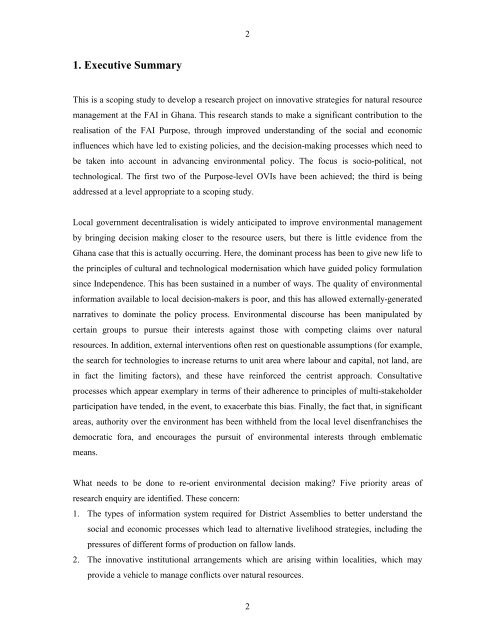Poverty Dimensions of Public Governance and Forest Management ...
Poverty Dimensions of Public Governance and Forest Management ...
Poverty Dimensions of Public Governance and Forest Management ...
You also want an ePaper? Increase the reach of your titles
YUMPU automatically turns print PDFs into web optimized ePapers that Google loves.
2<br />
1. Executive Summary<br />
This is a scoping study to develop a research project on innovative strategies for natural resource<br />
management at the FAI in Ghana. This research st<strong>and</strong>s to make a significant contribution to the<br />
realisation <strong>of</strong> the FAI Purpose, through improved underst<strong>and</strong>ing <strong>of</strong> the social <strong>and</strong> economic<br />
influences which have led to existing policies, <strong>and</strong> the decision-making processes which need to<br />
be taken into account in advancing environmental policy. The focus is socio-political, not<br />
technological. The first two <strong>of</strong> the Purpose-level OVIs have been achieved; the third is being<br />
addressed at a level appropriate to a scoping study.<br />
Local government decentralisation is widely anticipated to improve environmental management<br />
by bringing decision making closer to the resource users, but there is little evidence from the<br />
Ghana case that this is actually occurring. Here, the dominant process has been to give new life to<br />
the principles <strong>of</strong> cultural <strong>and</strong> technological modernisation which have guided policy formulation<br />
since Independence. This has been sustained in a number <strong>of</strong> ways. The quality <strong>of</strong> environmental<br />
information available to local decision-makers is poor, <strong>and</strong> this has allowed externally-generated<br />
narratives to dominate the policy process. Environmental discourse has been manipulated by<br />
certain groups to pursue their interests against those with competing claims over natural<br />
resources. In addition, external interventions <strong>of</strong>ten rest on questionable assumptions (for example,<br />
the search for technologies to increase returns to unit area where labour <strong>and</strong> capital, not l<strong>and</strong>, are<br />
in fact the limiting factors), <strong>and</strong> these have reinforced the centrist approach. Consultative<br />
processes which appear exemplary in terms <strong>of</strong> their adherence to principles <strong>of</strong> multi-stakeholder<br />
participation have tended, in the event, to exacerbate this bias. Finally, the fact that, in significant<br />
areas, authority over the environment has been withheld from the local level disenfranchises the<br />
democratic fora, <strong>and</strong> encourages the pursuit <strong>of</strong> environmental interests through emblematic<br />
means.<br />
What needs to be done to re-orient environmental decision making? Five priority areas <strong>of</strong><br />
research enquiry are identified. These concern:<br />
1. The types <strong>of</strong> information system required for District Assemblies to better underst<strong>and</strong> the<br />
social <strong>and</strong> economic processes which lead to alternative livelihood strategies, including the<br />
pressures <strong>of</strong> different forms <strong>of</strong> production on fallow l<strong>and</strong>s.<br />
2. The innovative institutional arrangements which are arising within localities, which may<br />
provide a vehicle to manage conflicts over natural resources.<br />
2
















